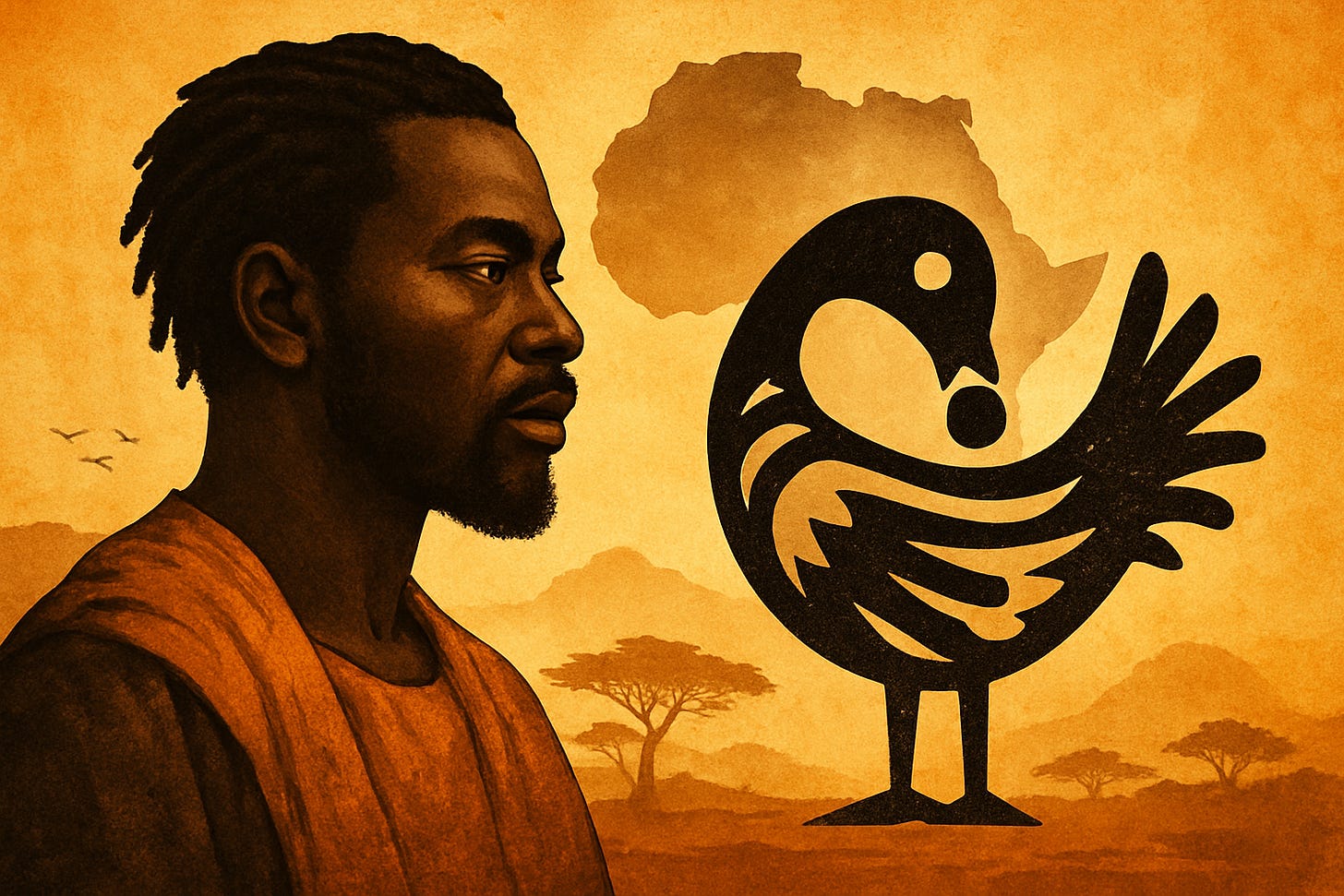Sankofa
Why Africa Must Remember to Rise
“We cannot rewrite the past, yet a past forgotten is a future prophesied.”
Africa is not asleep. She is not dead. But she is dreaming in someone else's story.
For centuries, Africa has been defined from the outside—from ships, from pulpits, from textbooks, from television screens. Each time, a different story was told: a savage continent, a dark land, a backward people in need of saving, shaping, or silencing. Yet Africa was speaking long before she was spoken of.
The tragedy is not just that our story was stolen. The tragedy is that we began to believe theirs.
A History Mis-told
We are taught history, yes. But rarely our history. What passes for African history in many classrooms is a carefully curated narrative: kings and queens reduced to anecdotes, civilizations ignored, languages misrepresented, and resistance movements erased. The curriculum begins with colonization—as though we were born in chains—and ends with independence movements, portrayed as gifts from benevolent empires rather than hard-won reclamations of dignity.
What about the before?
Before the Berlin Conference, before the Portuguese docked their ships, before the missionaries brought salvation and sorrow in the same breath—there was Africa. An Africa that governed, traded, healed, prayed, farmed, and philosophized. An Africa with its own timelines, spiritualities, and visions of beauty. These are not romantic fictions. They are truths buried under the weight of foreign narration.
The Wound of Disconnection
It has been more than half a century since most African nations achieved political independence. Yet the psychological chains remain. We measure our success by how Western we sound, how European we look, how global we become—without ever asking what it means to be fully African in the modern world.
Even more heartbreaking is the fate of those taken. Millions of Africans were ripped from their homelands, names erased, languages stolen, faiths shattered. Today, many of their descendants in the diaspora live with a longing they cannot name and a history they cannot touch. They know not their tribes. They know not their true names. Four centuries in Babylon, and still the trumpet of return sounds faint.
The plunder that followed Israel out of Egypt,
continues still,
only this time, the desert is digital
and the chains invisible. It’s as though someone struck out the phrase: "…until you return to plunder." from the scripture that reads "The Egyptians you see today, you shall see them no more...” This is not a critique of the holy book, though its narrative seems to mock us at times.
No, this is a trumpet.
A call.
Ethiopia, rise.
Your time has come.
The Modern Chains Are Polished
In the past, Africa was taken by force. Today, she is leaving willingly.
Migration is now a rite of passage. The goal is not to stay and build, but to leave and become. We now compete for visas like blessings, dress for job interviews like ceremonies of belonging, and trade our tongues for accents. We do not need to be enslaved; we volunteer.
What is more painful: the physical chain, or the desire to wear it?
Cape Coast Castle still stands. A tourist attraction now. But if you walk its dungeons, you can still smell the trauma. Still hear the ghosts. The pain of separation has calcified into stone.
Sankofa: The Road Back to Ourselves
In Akan tradition, there is the concept of Sankofa: to go back and fetch what was forgotten. It is not about living in the past, but about learning from it—recovering wisdom, dignity, and truth that modernity has buried.
Africa must practice Sankofa not just in memory, but in method. Our economies must remember the value of community. Our politics must remember the accountability of the village. Our spirituality must remember the sanctity of nature and life. Our youth must remember that innovation is not imitation.
This does not mean rejecting modernity. It means rejecting dependency. It means understanding that Africa’s difference was never a weakness—it was always a wealth.
The world now preaches “it’s okay to be different.”
But when Africa was different, she was punished for it.
Our morality was mocked. Our rituals demonized. Our expressions outlawed. And now, as the world clamors for freedom of identity, spirituality, and culture—it is rediscovering what Africa never forgot, yet was forced to abandon.
If Africa has memory, this is the time to say: “We have seen this before. We suffered. This time, we will choose our own path.”
A New Path Forward
This is not a call to return to huts or reject technology.
It is a call to return to truth.
Africa’s renaissance will not come from charity, foreign aid, or international applause. It will come from memory. From a deep reckoning with who we were, who we are, and who we choose to become. Africa must write her own story—in her own languages, on her own terms, guided by the wisdom of those who walked before us.
We were never primitive.
We were never queer in the sense used to shame us.
We were never broken.
We were just different.
And now, difference is the only thing that can save a world losing itself to sameness.
Africa: it is time to return.
Not to the past, but to yourself.


